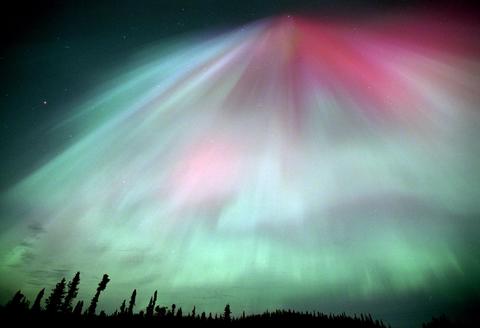A shockwave from the Sun hit the Earth on Wednesday, the final burst from a solar hurricane that has hampered some space satellite transmissions and led electric grid operators to curb power transmissions as a precaution.
Scientists said the cloud of charged particles unleashed at high speeds by a hyperactive Sun and known as a coronal mass ejection (CME) was traveling at more than 8 million kph, taking just 19 hours from the Sun.
Power plants from Sweden to New Jersey cut production to limit how much electricity was flowing over transmission grids, preparing to absorb any sudden surge in energy that might result in coming days from lingering effects of the storm.

PHOTO: AP
"It arrived at six this morning and was going much faster than people thought," Dr. Mike Hapgood, a space expert at the Appleton Laboratory in England said.
"There were some problems starting yesterday because of the effects that precede the arrival of this shock wave from the sun," Hapgood added.
"We expect this storm to continue through the day and tomorrow," said Larry Combs, a space-weather forecaster at the National Oceanographic and Atmospheric Administration's Space Environment Center in Boulder, Colorado.
The center, which acts as the official US space-weather watching agency advising power utility, airlines and communications network operators of potential threats from space, issued its first warning of the storm a week ago.
Just hours after the earlier ejection, the sun sent another cloud of charged particles speeding straight toward Earth, according to John Kohl of the Harvard-Smithsonian Center for Astrophysics.
Kohl, a senior astrophysicist, works with the SOHO satellite and said the latest coronal mass ejection left the sun around 4pm Eastern Standard Time on Wednesday. "It's pretty much coming right at us," Kohl said in a telephone interview.
This latest CME is not quite as big as the one that arrived at Earth earlier in the day, but Kohl said, "This doesn't mean that the radiation will be less."
The gaseous cloud that dumps energy into the magnetic field that surrounds the Earth, creating a geomagnetic storm, was the final wave in a three-stage solar storm that first began peppering the Earth with X-rays at around 11:10 GMT on Tuesday.
These X-rays, which were traveling at the speed of light, forced air traffic controllers to scramble to find alternative communications channels and affected satellite transmissions of images back to Earth, weather experts said.
Combs said that this was likely nothing more than normal operating procedure for most aircraft, except those flying over the polar ice cap.
In the second wave, a pulse of solar radiation hit the Earth. Image transmissions back from the SOHO satellite, which first detected the solar blast, degenerated into salt-and-pepper images for a time on Tuesday, forcing its operators to put the spacecraft into rest mode, NOAA said.
CMEs come around every few years but the one that arrived on Wednesday may rank as one of the strongest.

Four people jailed in the landmark Hong Kong national security trial of "47 democrats" accused of conspiracy to commit subversion were freed today after more than four years behind bars, the second group to be released in a month. Among those freed was long-time political and LGBTQ activist Jimmy Sham (岑子杰), who also led one of Hong Kong’s largest pro-democracy groups, the Civil Human Rights Front, which disbanded in 2021. "Let me spend some time with my family," Sham said after arriving at his home in the Kowloon district of Jordan. "I don’t know how to plan ahead because, to me, it feels

Polish presidential candidates offered different visions of Poland and its relations with Ukraine in a televised debate ahead of next week’s run-off, which remains on a knife-edge. During a head-to-head debate lasting two hours, centrist Warsaw Mayor Rafal Trzaskowski, from Polish Prime Minister Donald Tusk’s governing pro-European coalition, faced the Eurosceptic historian Karol Nawrocki, backed by the right-wing populist Law and Justice party (PiS). The two candidates, who qualified for the second round after coming in the top two places in the first vote on Sunday last week, clashed over Poland’s relations with Ukraine, EU policy and the track records of their

‘A THREAT’: Guyanese President Irfan Ali called on Venezuela to follow international court rulings over the region, whose border Guyana says was ratified back in 1899 Misael Zapara said he would vote in Venezuela’s first elections yesterday for the territory of Essequibo, despite living more than 100km away from the oil-rich Guyana-administered region. Both countries lay claim to Essequibo, which makes up two-thirds of Guyana’s territory and is home to 125,000 of its 800,000 citizens. Guyana has administered the region for decades. The centuries-old dispute has intensified since ExxonMobil discovered massive offshore oil deposits a decade ago, giving Guyana the largest crude oil reserves per capita in the world. Venezuela would elect a governor, eight National Assembly deputies and regional councilors in a newly created constituency for the 160,000

North Korea has detained another official over last week’s failed launch of a warship, which damaged the naval destroyer, state media reported yesterday. Pyongyang announced “a serious accident” at Wednesday last week’s launch ceremony, which crushed sections of the bottom of the new destroyer. North Korean leader Kim Jong-un called the mishap a “criminal act caused by absolute carelessness.” Ri Hyong-son, vice department director of the Munitions Industry Department of the Party Central Committee, was summoned and detained on Sunday, the Korean Central News Agency (KCNA) reported. He was “greatly responsible for the occurrence of the serious accident,” it said. Ri is the fourth person